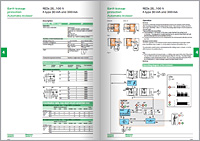Why use catalogues
 I'm a fan of using manufacturers catalogues. There are two main reasons for this.
I'm a fan of using manufacturers catalogues. There are two main reasons for this.
Firstly, if your involved in the purchase of equipment, you will likely need to look into catalogues to find what you need. If your involved in design or specification you should also be looking into catalogues. I'm a big believer that any engineer should not be specifying an item of equipment unless they have at least one product in mind which would fit the bill. Unfortunately this is not always the case and often equipment as detailed on drawings or specifications is not readily available as a standard device which the contractor can buy; leading to all sorts of problems.
Secondly, catalogues can be great source of technical information and learning. In contrast to a theoretical texts, catalogues by nature deal with an actual product and in a very practical sense. A lot of the information you get from reading catalogues this is just the type of information you need to be able to incorporate the product into your project in a way that works.
I'm not a great collector of paper or book, so while I use catalogues regularly I don't keep that many at hand. Google is pretty good at quickly finding the latest version of a catalogue. Failing that, spending a bit of time on a manufacturer's website can yield results.
I do have around ten hard copy catalogues I keep near by. These are ones I would use pretty regularly. Having these close at hand helps if colleagues arrives with questions - it's easy to show some real live examples of products.